Filter by
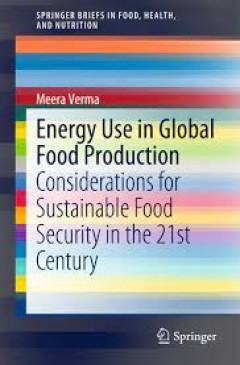
Energy Use in Global Food Production Considerations for Sustainable Food Sec…
This Brief examines the sustainability of energy use in global food production and processing. The nexus between food, water, and energy are explored against a background of climate change. Current efforts to reduce the energy intensity of food and increase sustainability are explored. Food waste and its impact on energy is covered, including regional variations and nutrient recycling method…
- Edition
- -
- ISBN/ISSN
- 978-3-319-16781-7
- Collation
- 4 illustrations in colour
- Series Title
- -
- Call Number
- -

Therapeutic Potentials of Curcumin for Alzheimer Disease
This is the first book on the market that explores the importance of curcumin for the treatment of neurological disorders. It has been estimated that 35.6 million people globally had dementia in 2010 and the prevalence of dementia has been predicted to double every 20 years. Thus, 115.4 million people may be living with dementia in 2050. Alzheimer’s disease (AD) is the leading cause of dement…
- Edition
- -
- ISBN/ISSN
- 978-3-319-15889-1
- Collation
- 45 b/w illustrations, 45 illustrations in colour
- Series Title
- -
- Call Number
- -
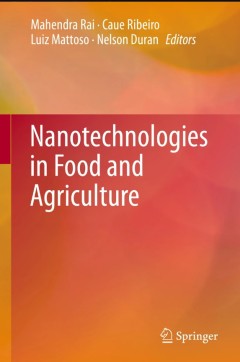
Nanotechnologies in Food and Agriculture
This book presents a comprehensive overview of new and emerging nanotechnologies. It includes aspects of nanoparticle monitoring, toxicity, and public perception, and covers applications that address both crop growing and treatment of agricultural wastewater. Topics include nanoagrochemicals (nanofertilizers, -pesticides, -herbicides), nanobiosensors, and nanotechnologies for food processing, p…
- Edition
- 1
- ISBN/ISSN
- 978-3-319-14023-0
- Collation
- XV, 347
- Series Title
- -
- Call Number
- -
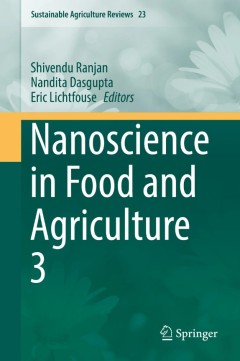
Nanoscience in Food and Agriculture 3
This book is the third volume on Nanoscience in Food and Agriculture, published in the Sustainable Agriculture Reviews series. In this book we present ten chapters describing the synthesis and application of nanomaterials for health, food, agriculture and bioremediation. Nanomaterials with unique properties are now being used to improve food and agricultural production. Research on nanomateria…
- Edition
- 1
- ISBN/ISSN
- 978-3-319-48008-4
- Collation
- XIII, 289
- Series Title
- Sustainable Agriculture Reviews
- Call Number
- -
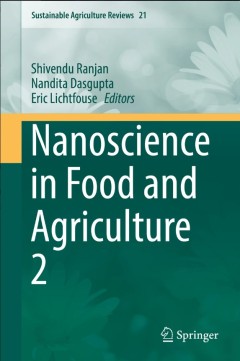
Nanoscience in Food and Agriculture 2
This book is the second volume on this topic within the series. With unique properties, nanomaterials are rapidly finding novel applications in many fields such as food, medicine, agriculture and pollution. Such applications include to treat cancer, nanosensors to detect food contamination, nanomaterials for food packaging, nanoencapsulation to preserve nutraceuticals, and nanofertilisers for…
- Edition
- 1
- ISBN/ISSN
- 978-3-319-39305-6
- Collation
- XVII, 373
- Series Title
- Sustainable Agriculture Reviews
- Call Number
- -
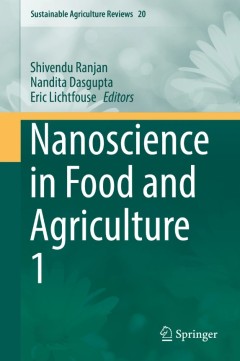
Nanoscience in Food and Agriculture 1
Nanotechnology is a fast-evolving discipline that already produces outstanding basic knowledge and industrial applications for the benefit of society. Whereas the first applications of nanotechnology have been developed mainly in material sciences, applications in the agriculture and food sectors are still emerging. Due to a rapid population growth there is a need to produce food and beverages …
- Edition
- 1
- ISBN/ISSN
- 978-3-319-39302-5
- Collation
- XIX, 324
- Series Title
- Sustainable Agriculture Reviews
- Call Number
- -
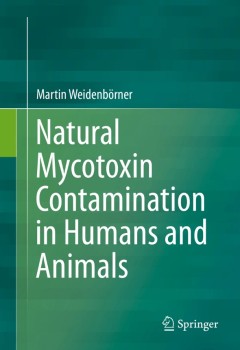
Natural Mycotoxin Contamination in Humans and Animals
This book presents a review of the existing literature on natural mycotoxins to create a comprehensive reference for mycotoxin levels. Each entry includes contamination, concentration rate, mostly mean mycotoxin concentration of organs (human and animal) and country of origin of the sample. Due to the serious spoilage and health issues the presence of mycotoxins can cause, it is imperative tha…
- Edition
- 1
- ISBN/ISSN
- 978-3-319-16039-9
- Collation
- XXVIII, 360
- Series Title
- -
- Call Number
- -

The Sustainability of Agro-Food and Natural Resource Systems in the Mediterra…
This book is focused on the challenges to implement sustainability in diverse contexts such as agribusiness, natural resource systems and new technologies. The experiences made by the researchers of the School of Agricultural, Forestry, Food and Environmental Science (SAFE) of the University of Basilicata offer a wide and multidisciplinary approach to the identification and testing of differ…
- Edition
- -
- ISBN/ISSN
- 978-3-319-16357-4
- Collation
- -
- Series Title
- -
- Call Number
- -

Emerging Economies Food and Energy Security, and Technology and Innovation
This volume brings together research on development in three major areas of contemporary global relevance: agriculture and food security, energy, and the institutions of national innovation. Covering six of the largest emerging and developing economies (EDEs) in the world, three Asian (China, India and Malaysia), two Latin American (Brazil and Mexico), and one African (South Africa), the book …
- Edition
- 1
- ISBN/ISSN
- 978-81-322-2101-2
- Collation
- 99 b/w illustrations
- Series Title
- -
- Call Number
- -
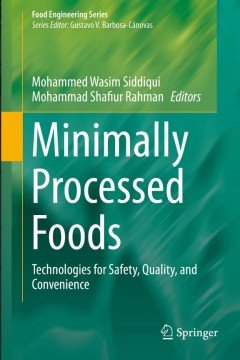
Minimally Processed Foods
The safety and efficacy of minimal food processing depends on the use of novel preservation technologies. This book first examines what is meant by minimally processed foods, including fresh-cut, cooked-chilled, and part-baked products. Next explored are the technologies or methods to produce quality products in terms of safety and nutrition, including: edible coating, natural preservatives (i.…
- Edition
- 1
- ISBN/ISSN
- 978-3-319-10676-2
- Collation
- XII, 306
- Series Title
- Food Engineering Series
- Call Number
- -
 Computer Science, Information & General Works
Computer Science, Information & General Works  Philosophy & Psychology
Philosophy & Psychology  Religion
Religion  Social Sciences
Social Sciences  Language
Language  Pure Science
Pure Science  Applied Sciences
Applied Sciences  Art & Recreation
Art & Recreation  Literature
Literature  History & Geography
History & Geography